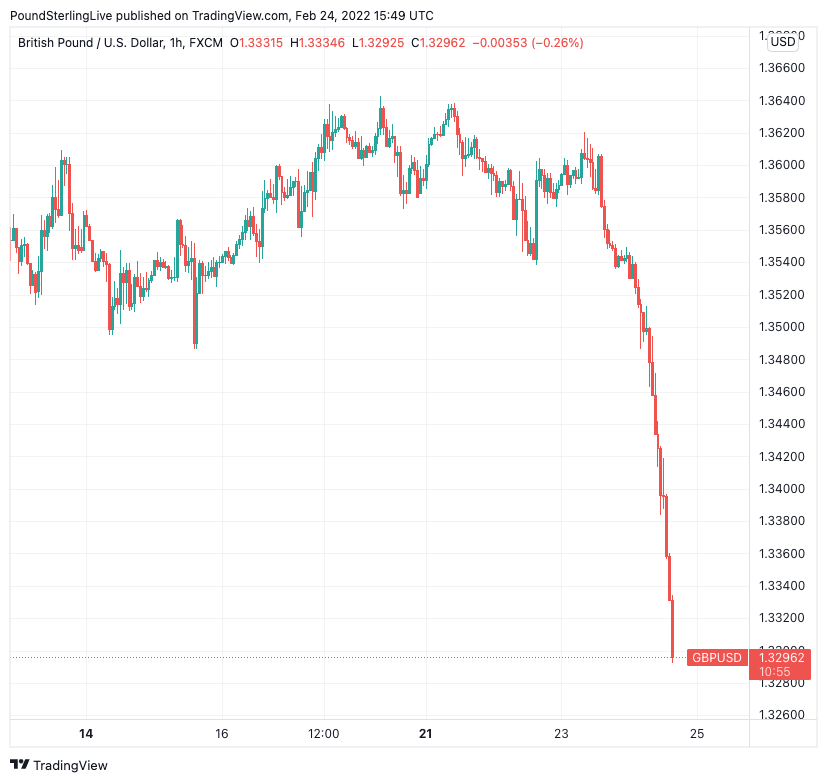SWIFT Headlines Smash the Pound against the Euro, Dollar
- Written by: Gary Howes

Image © Adobe Stock
News that Boris Johnson is looking to have Russia ejected from the SWIFT payments section appears to have undermined Pound Sterling significantly.
The British Pound initially took news of the Russian invasion of Ukraine in its stride, losing some ground to the Dollar and even advancing against the Euro.
But the bottom fell out of the Sterling market in the London afternoon session and the UK currency was haemorrhaging some notable losses, with a significant portion of the inter-day decline coming around headlines that Prime Minister Boris Johnson was looking to eject Russia from the SWIFT payments system.
Johnson was reported by the FT to be pushing "very hard" for Russia to be ejected from SWIFT, saying this would be "a move that would deliver a heavy blow to the country’s banks and its ability to trade beyond its borders".
SWIFT is a financial messaging platform that connects more than 11,000 banking and securities organisations.
It is for this reason financial analysts see pulling SWIFT as being akin to a nuclear-powered sanction.
"This is the most severe of the options on the table, as a disconnection of Russia from SWIFT would basically isolate the country and its businesses from Western markets," says Rich Kelley, analyst at TD Securities.
Above: GBP/USD at daily intervals.
- Reference rates at publication:
GBP to EUR: 1.1965 \ GBP to USD: 1.3301 - High street bank rates (indicative): 1.1730 \ 1.3029
- Payment specialist rates (indicative): 1.1905 \ 1.3235
- Find out more about specialist rates and service, here
- Set up an exchange rate alert, here
At the time of writing the Pound is on course for its biggest one-day sell-off against the Dollar since the market's Covid meltdown back in 2020.
The Pound to Dollar exchange rate is down nearly 2.0% at 1.3282 while the Pound to Euro exchange rate is down a third of a percent at 1.1938.
Excluding Russia would potentially exact the most punitive possible financial sanction on the country.
But German chancellor Olaf Scholz is reported by the FT to have said to Johnson Germany would not support such a dramatic move and neither would the EU.
"Obtaining the approval for a disconnection would require an ample majority in the board of SWIFT which is dominated by European players," says Kelly.
Senior EU sources told CNN that there is a divide in the member states between countries like Poland, Estonia, Latvia and Lithuania who want SWIFT as part of the sanctions package that will be announced later today.
They confirm Germany is resistant, but soo too is Italy, Hungary and Cyprus, "who have stronger economic ties to Russia".
"European countries need access to the Russian banking system to transfer payments for oil and gas supplies and will, therefore, be extremely reluctant to force Russia out," says Kelly.
Nevertheless, "the PM is very keen on this - he’s pushing it very hard," a source told the FT of Johnson's objectives.
The UK's economy has a significant financial services sector that sits in the heart of global finance and ejecting Russia from SWIFT could trigger notable outflows of currency.
Johnson was initially criticised for a meagre set of sanctions earlier in the week, but pulling the plug on SWIFT would represent a significant about-turn in stance.
Kelly says excluding Russia from SWIFT would result in "total untradability of Russian assets. Oil, gas and other commodity prices increase permanently."





